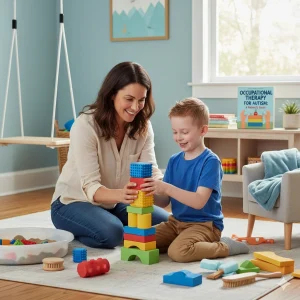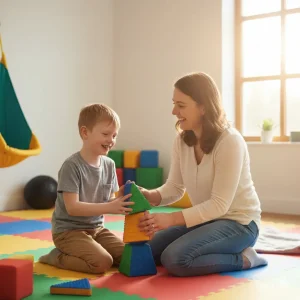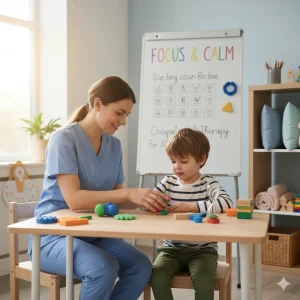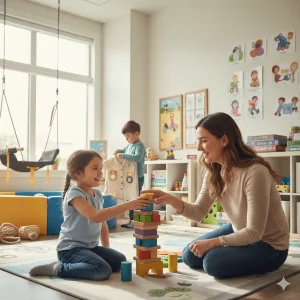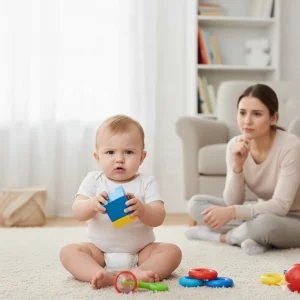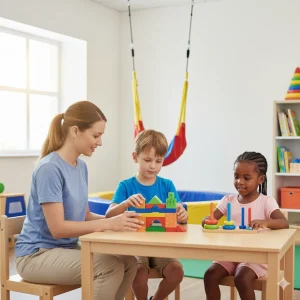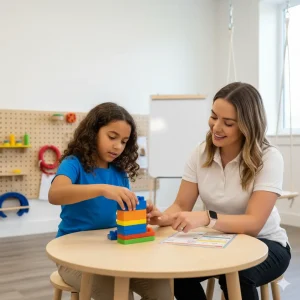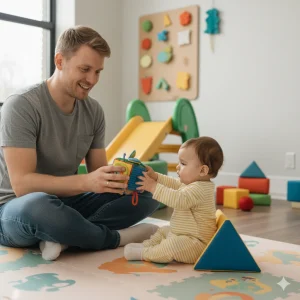Boosting Toddler Development: Occupational Therapy Insights
By Prapoorna M
Last Updated: February 1, 2024
Developmental delays in toddlers can be a puzzling and concerning topic for any parent. Is my child hitting their milestones? Why does playtime seem challenging for them? These are common questions you might have. Occupational therapy offers a beacon of hope, providing practical strategies to support your child’s developmental journey.
But here’s the good news: occupational therapy doesn’t have to be complicated or overwhelming. It can be an easy, integrative part of your daily routine, offering fun and engaging ways to aid your toddler’s development. By embracing simple, effective methods, you can turn everyday moments into opportunities for growth and learning.
For more insights into how counseling can support your family during your child’s developmental journey, explore our comprehensive counseling services.
Understanding Developmental Delays in Toddlers
What Exactly Are Developmental Delays?
Think of developmental milestones as checkpoints in your child’s growth journey, like the first words or steps. Developmental delays occur when children take a bit longer to reach these milestones compared to most kids their age. It’s like being on a road trip and taking a few extra stops along the way.
Spotting the Signs
Being a keen observer can help you notice if your child is experiencing these delays. Look for signs like difficulties in crawling, walking, talking, or playing. Maybe your little one isn’t using as many words as children their age typically do, or perhaps they seem less interested in interactive games. It’s important to remember, though, that every child is unique in their growth pattern.
Understanding the nature of grief can be essential for parents coping with the emotional aspects of a child’s developmental delays.
The Power of Early Intervention
Here’s a comforting thought: early intervention can work wonders. Catching and addressing developmental delays early can significantly improve outcomes. It’s like providing a helping hand just when your child needs it the most, guiding them back on track with their development.
Learn more about early signs of autism spectrum disorder to better understand developmental challenges.
Comparison of Typical and Delayed Development
| Age | Typical Milestones | Signs of Delay |
|---|---|---|
| 6 Months | – Begins to sit without support – Reaches for objects – Responds to sounds and voices | – Difficulty in holding head up – Not reaching for objects – Lack of response to sounds |
| 1 Year | – Stands with support – Says simple words like “mama” – Imitates gestures and sounds | – Unable to crawl or stand with support – Not using simple words – Lack of gesture imitation |
| 18 Months | – Walks independently – Eats with a spoon – Recognizes familiar people and objects | – Difficulty walking or not walking – Struggles with using utensils – Not recognizing familiar faces |
| 2 Years | – Begins to run – Speaks in two-word sentences – Follows simple instructions | – Cannot walk steadily or run – Limited speech or no two-word sentences – Difficulty following instructions |
The Role of Occupational Therapy in Addressing Delays
How Does Occupational Therapy Help?
Occupational therapy steps in as a friendly assistant in your child’s development. It’s about making daily activities easier and more enjoyable. Occupational therapists are like detectives and problem-solvers, figuring out where your child needs support and providing fun, engaging ways to help them develop those skills.
Simple, Practical Techniques
Imagine therapy sessions that look more like playtime than a doctor’s visit. Therapists might use games, toys, or everyday objects to improve your child’s motor skills, cognitive abilities, and social interactions. It could be as simple as stacking blocks to improve hand-eye coordination or playing ‘Simon Says’ to boost listening and following instructions.
Real-Life Impact of Therapy
Let’s paint a picture: occupational therapy can transform the simple act of holding a spoon into a victory for a toddler struggling with fine motor skills. For a child working on speech, successfully asking for a toy can be a huge milestone. Socially, participating in a group activity at a playgroup can be a major step forward. Each of these moments are building blocks for your child’s brighter, more independent future.
To further aid your child’s speech development, consider exploring our online speech therapy programs.
Simple Strategies for Parents at Home
Everyday Therapy Made Easy
Transforming your home into a nurturing space for development is easier than you think. With some creativity and a few simple exercises, you can turn playtime into a therapeutic session. Here are some ideas:
Obstacle Course Fun: Use pillows or soft toys to create a simple obstacle course. This encourages motor skill development as your toddler learns to navigate through it.
Arts and Crafts: Finger painting or clay modeling aren’t just fun; they’re fantastic for developing fine motor skills and unleashing creativity.
Story Time with Actions: When reading to your toddler, encourage them to mimic the actions of characters. It’s a playful way to boost both cognitive and physical skills.
Remember, the key is to make these activities feel like a game. Your enthusiasm and participation can turn these exercises into cherished bonding moments.
For more activities, check out our guide on home-based occupational therapy activities.
Creating a Supportive Environment
Routine is Comfort: Establish a daily routine that includes these therapeutic activities. Consistency provides a sense of security and aids in learning.
Praise Efforts, Not Just Success: Celebrate the attempts and the progress, not just the achievements. This builds confidence and encourages your child to keep trying.
Activity Ideas for Home-Based Occupational Therapy
| Activity | Skills Developed | Tips for Parents |
|---|---|---|
| Puzzle Games | Fine Motor Skills, Problem-Solving, Cognitive Skills | Choose age-appropriate puzzles; encourage but don’t solve it for them. |
| Play Dough | Fine Motor Skills, Creativity, Sensory Processing | Encourage making shapes and figures; use different colors and textures. |
| Story Time with Actions | Language Development, Motor Skills, Imagination | Act out parts of the story; use facial expressions and gestures. |
| Building Blocks | Fine Motor Skills, Spatial Awareness, Coordination | Build structures together; challenge them to create specific shapes. |
| Coloring and Drawing | Fine Motor Skills, Creativity, Focus | Provide a variety of coloring tools; encourage them to draw their own pictures. |
| Imitation Games | Social Skills, Language Development, Cognitive Skills | Play ‘Simon Says’ or mimic animal sounds and movements. |
| Sorting Activities | Cognitive Skills, Fine Motor Skills, Organizational Skills | Use items like buttons or beads to sort by color, size, or shape. |
| Music and Rhythm Activities | Auditory Skills, Motor Skills, Pattern Recognition | Use simple instruments or clap to rhythms; create a fun dance routine. |
Parents can also benefit from reading about tips for parenting an autistic child, which can complement occupational therapy techniques.
Recognizing When to Seek Professional Help
Spotting the Need for Extra Support
While these home strategies are beneficial, sometimes professional intervention is necessary. Look out for:
- Lack of progress in achieving milestones.
- Difficulty in basic tasks like eating, dressing, or interacting.
- Overwhelming challenges that don’t improve with home strategies.
For a deeper understanding of autism treatments, check out our autism treatment centre.
The Importance of Professional Assessment
An early professional assessment can make a significant difference. It helps tailor the therapy to your child’s unique needs, ensuring they receive the most effective support.
Wellness Hub’s Expert Guidance
At this juncture, Wellness Hub can step in to provide that expert guidance and support. Our team of specialists offers personalized therapy tailored to each child’s unique journey. With Wellness Hub, you’re not just getting therapy; you’re gaining a partner in your child’s developmental journey.
If you’re considering therapy, our speech therapy services can provide additional support.
Wrapping It Up: Embracing Simplicity in Therapy
The journey of supporting a child with developmental delays doesn’t have to be complex or daunting. Instead, it can be a path filled with small, joyful victories and simple, effective strategies.
The Key to Gentle and Effective Therapy
Remember, the essence of occupational therapy lies in its gentle approach, turning everyday activities into therapeutic opportunities. Whether it’s playtime turned into a fine motor skills exercise or a bedtime story that enhances language development, the power of therapy lies in its simplicity and relevance to daily life.
A Message of Hope and Encouragement
To all the parents and caregivers reading this: know that you are not alone on this journey. Every small step your child takes is a leap in their development, and every effort you make contributes significantly to their progress. Embrace these moments with patience and positivity.
Understand more about speech and language milestones to complement your knowledge about developmental progress.
conclusion
Occupational therapy, at its core, is about finding simple, playful ways to help your child overcome developmental delays. It’s about turning everyday activities into opportunities for growth, making the journey of development both enjoyable and effective.
Throughout this guide, we have emphasized the importance of early intervention and the powerful role that simple, home-based activities can play in supporting your child’s development. These activities are not only therapeutic but also offer a wonderful chance for bonding and creating joyful memories.
At Wellness Hub, we understand that every child’s path is unique, and we are dedicated to providing personalized, professional help. Our team of experts is here to support you and your child every step of the way, offering tailored advice and therapy sessions that align with your child’s individual needs.
Frequently Asked Questions:
1. What is Occupational Therapy for Toddlers?
Occupational therapy for toddlers involves engaging them in activities that help develop their motor skills, cognitive abilities, and social interactions. It’s designed to be fun and engaging, helping children reach developmental milestones through play-based learning.
2. How Can I Tell if My Toddler Needs Occupational Therapy?
Look for signs like delays in reaching milestones such as walking, talking, or difficulties in daily activities like eating or dressing. If your child seems to struggle more than peers, it might be worth considering an assessment.
3. What Are Some Simple Occupational Therapy Exercises for Home?
Simple activities like stacking blocks, sensory play with different textures, or interactive storytelling can be effective. These exercises help improve fine motor skills, cognitive development, and social interaction in a fun, engaging way.
4. When Should I Seek Professional Help for My Child’s Developmental Delays?
If you notice persistent developmental delays or if your child struggles significantly with basic tasks, it’s advisable to seek professional help. Early intervention can lead to more effective results.
5. How Does Wellness Hub Approach Occupational Therapy for Toddlers?
Wellness Hub offers personalized, child-friendly occupational therapy tailored to each toddler’s needs. Our approach is gentle, engaging, and designed to make therapy enjoyable and effective for young children.
6. Can Occupational Therapy Help with Social Skills Development?
Yes, occupational therapy can significantly aid in developing social skills. Therapists use interactive games and activities to improve communication, cooperation, and social interaction.
7. Is Occupational Therapy at Home as Effective as Professional Sessions?
Home-based occupational therapy exercises are beneficial and can complement professional sessions. However, they should not replace professional therapy, especially for children with significant developmental delays.
8. How Long Does It Take to See Progress with Occupational Therapy?
The time to see progress can vary based on the child’s individual needs and the frequency of therapy sessions. Celebrating small achievements along the way is important for continued development.
9. What Role Do Parents Play in Occupational Therapy?
Parents are crucial in occupational therapy. They provide emotional support, reinforce exercises at home, and ensure a consistent routine, all of which contribute significantly to the therapy’s success.
10. How Can I Get Started with Occupational Therapy for My Child at Wellness Hub?
To begin occupational therapy at Wellness Hub, visit our website or contact our team for an initial consultation. We’ll guide you through the assessment process and discuss the best approach for your child’s unique needs.
About the Author:
Prapoorna Mangalampalli, Psychologist
Prapoorna, an author with dual master’s degrees in Psychology and English, excels in exploring and enhancing human experiences. Her writing, characterized by deep empathy and insight, primarily focuses on the complexities of counseling, spanning areas such as online, marital, relationship, child, family, and career counseling. Specialized training in various counseling sectors underscores her dedication to positive change. In her blogs, Prapoorna offers valuable guidance and a unique perspective for parents of children with Autism and special needs, creating a supportive community in this realm.
Book your Free Consultation Today
Parent/Caregiver Info:
Client’s Details:
* Error Message


